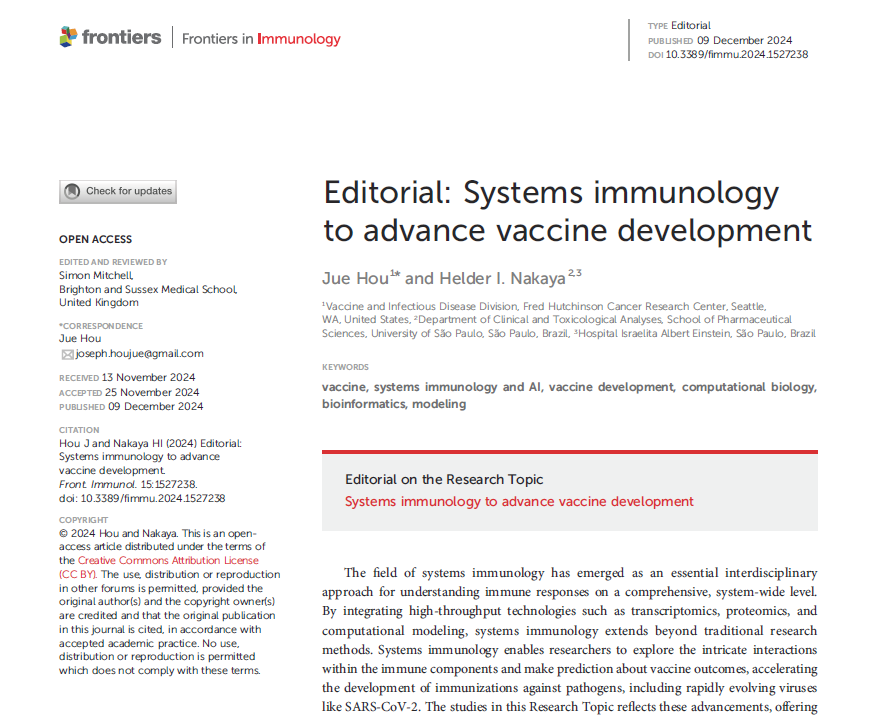Editorial: Systems immunology to advance vaccine development.
The field of systems immunology has emerged as an essential interdisciplinary approach for understanding immune responses on a comprehensive, system-wide level. By integrating high-throughput technologies such as transcriptomics, proteomics, and computational modeling, systems immunology extends beyond traditional research methods. Systems immunology enables researchers to explore the intricate interactions within the immune components and make prediction about vaccine outcomes, accelerating the development of immunizations against pathogens, including rapidly evolving viruses like SARS-CoV-2. The studies in this Research Topic reflects these advancements, offering fresh insights into the molecular and computational aspects of immune system dynamics, which are crucial for improving vaccine efficacy. Our Research Topic has brought together 133 authors worldwide, culminating in 16 articles showcasing cutting-edge research. These contributions cover a range of themes, from immune receptor dynamics and biomarker discovery to computational modeling and predictive analytics in vaccine responses.
Publication Year
Publication Journal
Associeted Project
Systems Immunology of Human Diseases
Lista de serviços
-
Genomic analyses reveal broad impact of miR-137 on genes associated with malignant transformation and neuronal differentiation in glioblastoma cells.Genomic analyses reveal broad impact of miR-137 on genes associated with malignant transformation and neuronal differentiation in glioblastoma cells.
-
RNA-Binding Protein Musashi1 Is a Central Regulator of Adhesion Pathways in Glioblastoma.RNA-Binding Protein Musashi1 Is a Central Regulator of Adhesion Pathways in Glioblastoma.
-
MicroRNA Transcriptome Profiling in Heart of Trypanosoma cruzi-Infected Mice: Parasitological and Cardiological Outcomes.MicroRNA Transcriptome Profiling in Heart of Trypanosoma cruzi-Infected Mice: Parasitological and Cardiological Outcomes.
-
Genome mapping and expression analyses of human intronic noncoding RNAs reveal tissue-specific patterns and enrichment in genes related to regulation of transcription.Genome mapping and expression analyses of human intronic noncoding RNAs reveal tissue-specific patterns and enrichment in genes related to regulation of transcription.
-
Antimicrobial peptide LL-37 participates in the transcriptional regulation of melanoma cells.Antimicrobial peptide LL-37 participates in the transcriptional regulation of melanoma cells.
-
Down-regulation of 14q32-encoded miRNAs and tumor suppressor role for miR-654-3p in papillary thyroid cancer.Down-regulation of 14q32-encoded miRNAs and tumor suppressor role for miR-654-3p in papillary thyroid cancer.
-
Integration of miRNA and gene expression profiles suggest a role for miRNAs in the pathobiological processes of acute Trypanosoma cruzi infection.Integration of miRNA and gene expression profiles suggest a role for miRNAs in the pathobiological processes of acute Trypanosoma cruzi infection.
-
Integrative Biology Approaches Applied to Human DiseasesIntegrative Biology Approaches Applied to Human Diseases
-
Proteomics reveals disturbances in the immune response and energy metabolism of monocytes from patients with septic shock.Proteomics reveals disturbances in the immune response and energy metabolism of monocytes from patients with septic shock.
-
Genomics, epigenomics and pharmacogenomics of Familial Hypercholesterolemia (FHBGEP): A study protocol.Genomics, epigenomics and pharmacogenomics of Familial Hypercholesterolemia (FHBGEP): A study protocol.
-
Melatonin-Index as a biomarker for predicting the distribution of presymptomatic and asymptomatic SARS-CoV-2 carriersMelatonin-Index as a biomarker for predicting the distribution of presymptomatic and asymptomatic SARS-CoV-2 carriers
-
Profiling plasma-extracellular vesicle proteins and microRNAs in diabetes onset in middle-aged male participants in the ELSA-Brasil study.Profiling plasma-extracellular vesicle proteins and microRNAs in diabetes onset in middle-aged male participants in the ELSA-Brasil study.
-
Big Data and machine learning in cancer theranosticsBig Data and machine learning in cancer theranostics
-
Genomic positional conservation identifies topological anchor point RNAs linked to developmental loci.Genomic positional conservation identifies topological anchor point RNAs linked to developmental loci.
-
Integrative systems immunology uncovers molecular networks of the cell cycle that stratify COVID-19 severityIntegrative systems immunology uncovers molecular networks of the cell cycle that stratify COVID-19 severity

